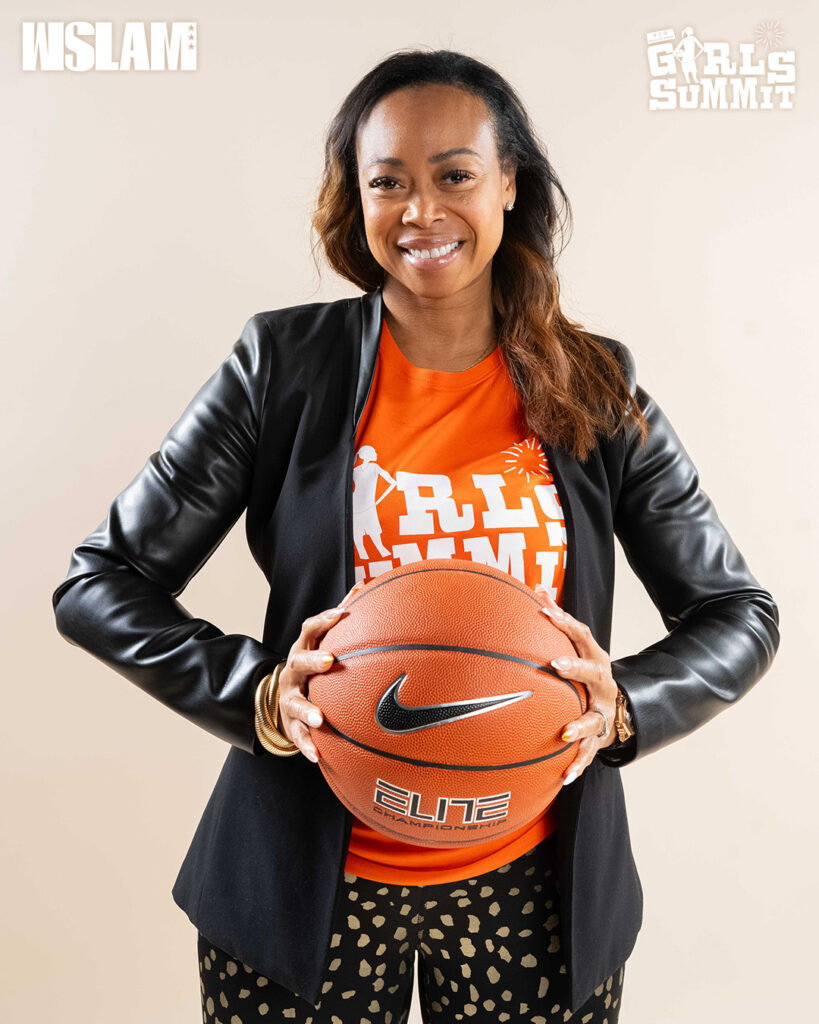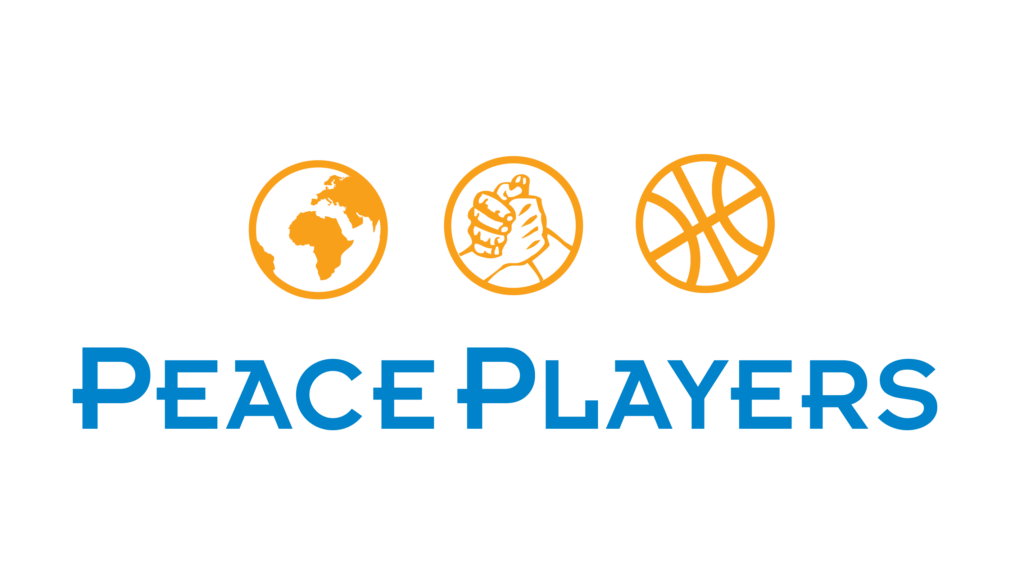Meet Sanura Young, PeacePlayers Chicago's New Director
April 10, 2024
SHARE
PeacePlayers: Tell us a little bit about yourself.
Sanura: I think what sums me up is, I’m a little girl from the south side of Chicago. What that means to me is resilience. It means being able to play the cards you’re dealt. And what it means to me is survival – surviving until you can thrive. My personal values, I think, are aligned with that little girl from Chicago, which are the values of hard work, the value of showing up, the value of putting yourself in uncomfortable situations so that you can grow, never remaining the same – being willing to evolve.
I was a young girl who left sports early, and always regretted it. But I married a husband who is an athlete, and from an athletic family, and somehow, he made a deal with God, and all three of our children are athletes. And they’ve had the pleasure of being Division One athletes. So, being a part of athletics for so many years, because of my children’s high level of involvement and my husband’s love of sports – it really solidified for me the doors, the opportunities, the things that sports teaches. The places that it takes you, not just around the country, but around the world. My son played football for Columbia, and in his last year, they went to Tokyo to play. They were meeting with the consulates. They were meeting with Japanese [dignitaries]. Just having experiences that they would never have had outside of playing a sport. And just the ability to deal with adversity, the ability to push yourself to your limits and see that you can go beyond that. The ability to learn how to win, because that’s also a skill, right?
Another thing about me is, I’m a builder. I’ve learned that about myself, the older I’ve gotten. You kind of figure out what kind of gets your creative juices flowing, your blood pumping. And it’s clear to me that building is a part of that for me, being able to conceptualize a vision and then being able to execute on that is exciting and it definitely is in my wheelhouse. I’ve never been the “roll with it” type of personality. And sometimes I really wanted to, because it would have been a lot easier. But ultimately, I’m gonna be the person who asks questions. I’m gonna be the person who says, ‘Well, have we thought about it from this approach? What were the results’?

And I think what makes me tick – the things that excite me – are my family and my faith. And I value people, or at least I try to value people, and what they can offer. The different voices in the room are important. So, I value diversity. I think the thread throughout my career has been equity. And so I balance everything against my personal ‘why.’ And my personal ‘why’ is really simple. It is functioning and serving in ways that create opportunity and access for other people to be the best versions of themselves. Those are my core values. Those are my personal beliefs.
And one last thing is I’m a world traveler. I love to travel, and that’s also one of the things that drew me to PeacePlayers – the global impact. My favorite place in the world is South Africa, and I can’t wait to get back.

Peaceplayers: What drew you to PeacePlayers, and is there anything in your personal or professional history that led you here?
Sanura: I’ve spent most of my career in public service – local government and nonprofits. And so, when I worked for one of the local cities here, I went back and got my MBA, and after I finished, I decided to leave that position and start a consulting company specific to nonprofits. And so, it was helping them function at their highest level, but it gave me the opportunity to be very entrepreneurial as well, which I’m grateful for.
I functioned in that for several years, and then one of my clients came to me and said, ‘Hey, I have this great idea. And I said, ‘Oh, gosh! What is it?’ And he said that there’s an impending shortage in the number of pilots that are trained and ready for work. He said he wanted to create a nonprofit that helps support young kids who want to be pilots. But more importantly, kids who come from disinvested communities, who would otherwise not have the opportunity. And so, I said, ‘Oh, wow! That’s really cool.’ And so we began to build that organization, and that organization’s name is Tuskegee, Next Foundation. I loved the work, and I literally built it with my bare hands. So, I was excited to be able to come on board as its inaugural executive director, and I was there for about six years.
I left at the end of 2019, not knowing that Covid was coming. My intent was to take a professional Sabbatical, which I did. However, a couple of months later, Covid hit. So I said, ‘Okay, well, this will last a couple of weeks, and I’ll be back at it,’ Well, we all know it was a very long Sabbatical. And once I accepted that Covid was going to be ongoing, I decided to go back to consulting. And again, a lot of organizations didn’t know what was going on. None of us really knew how long this was going to last, and a lot of them needed support.
Eventually I start to think, ‘What’s next?’ I really wanted to join an organization that’s not just for equity and in line with the work that I want to do. But it needed to be a really really good fit all around.
And so I began to look and meet with my network. I wanted to be picky about what I did next and had the privilege to be able to be picky – privileged enough to be able to say, I want to take some time and really figure out what’s next. And then comes PeacePlayers.
Everything that sports teaches – that’s what brings me to the work. That’s what attracts me to the mission of PeacePlayers, as well as its ability to transform lives for people, and then, hopefully, transform communities. If we’re able to figure out how to do that well and more efficiently and be more impactful, we could really make a global impact in a very real way.
PeacePlayers: Was there a certain person or experience that influenced the path you’ve taken so far?
Sanura: I wouldn’t say there was one person. There definitely has been a community of people. My father’s a pastor. My mother works for Wycliffe Bible translators. My grandmother was a teacher. My other grandmother was in civil service her entire career. My grandfather was in the military. I mean everyone around me growing up was in service in some way and making sure that people’s lives were better. So, that really has been modeled for me throughout my life, and I guess I picked up on it.
PeacePlayers: What’s one piece of advice that you would give your younger self if you could?
Sanura: Relax. It’ll come. I just remember always being anxious, you know. And a part of that tension has kept me motivated to move forward. But as we grow older, you realize a lot of things are going to work themselves out regardless. So, I think I would tell myself to relax. It’ll come.
PeacePlayers: What are your hopes and aspirations for PeacePlayers Chicago?
Sanura: My hopes and aspirations for PeacePlayers Chicago is that we weave ourselves into the fabric and the tapestry here in Chicago that is so rich and diverse. Basketball resonates. Sports, in general, resonates here in Chicago. And the need for peace and the need to transform communities also resonates very deeply here in Chicago. And so, being able to make sure that we are a fine-tuned, well-oiled machine that is highly functioning, and that could really bring impactful and transformative programming and experiences to the young people here in Chicago – that is really my hope and my dream. There’s so many resources and so many potential opportunities to collaborate across the city and across the region. And I really want PeacePlayers Chicago to step up and take on the role of a convener here and connect all those dots, and boldly say, ‘We don’t have all the answers. However, we’re committed to being a voice in this space, here in Chicago.’ Because there’s too many kids dying. There’s too many kids not having a future. And so the price of doing nothing – we can’t live with that.
PeacePlayers: And do you have any ideas for steps or specific things on the ground that you think can help connect those dots, like you said?
Sanura: I think connecting the dots means connecting like minded organizations, connecting academic partners, connecting institutional partners – to the work. And not just saying we want to bridge communities, but actually being the bridge and building programming that bridges. We’re showing the community how to bring people together, not just by bringing kids together from different conflicted neighborhoods. But if we’re coming together and bridging our organizations, then less of our kids fall through the cracks. And I want and need us to be that.



